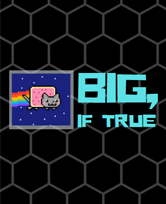Friday, January 29, 2021 – In this episode of Big, If True, our host Joan Donovan, PhD asks: what can mis- and disinformation scholars learn from the security studies field? What happens when security threats are inflated by governments? And how do security scholars analyze and account for civil liberties against the rise of digital search tools and surveillance?
The new year brings with it a calamity of new and old vulnerabilities and uncertainties: the roll-out of COVID-19 vaccines, cybersecurity data breaches and hacks, openings to expand state power, and opportunities for resistance. As we clumsily embrace the unsettled state of things, we also face a ripe moment for governments and media manipulators to capitalize on a fragile media ecosystem and shifting political landscapes. For many security studies scholars, there is an imperative to understand how advanced information technologies have created national vulnerabilities, increased instabilities in international relations, exploited and stockpiled user data, and allowed unauthorized people to intercept and infiltrate communications. In order to think through these complexities, we turn to experts Susan Landau, PhD (Tufts), Erik Lin-Greenberg, PhD (MIT), and Gabrielle Lim (Harvard) to help us untangle what this means for mis- and disinformation campaigns, and how interdisciplinary collaboration can unmask new strategies for pushing back against government overreach.
You can find a recording of the conversation below. Thanks to GBH’s Forum Network for streaming and recording this event for us!
Susan Landau is Bridge Professor in the Fletcher School of Law and Diplomacy and the School of Engineering, Department of Computer Science, Tufts University. Her book, “Listening In: Cybersecurity in an Insecure Age,” was recently published by Yale University Press. Landau has testified before Congress and briefed U.S. and European policymakers on encryption, surveillance, and cybersecurity issues. Landau has been a Senior Staff Privacy Analyst at Google, a Distinguished Engineer at Sun Microsystems, and a faculty member at Worcester Polytechnic Institute, the University of Massachusetts and Wesleyan University. She is a member of the Cybersecurity Hall of Fame, a fellow of the American Association for the Advancement of Science and of the Association for Computing Machinery.
Erik Lin-Greenberg is an Assistant Professor of Political Science at MIT. His research examines how emerging military technology affects conflict dynamics and the regulation and use of force. Lin-Greenberg’s current book project leverages experimental methods, archival research, elite interviews, and surveys to study how remote warfighting technologies – like drones and cyber warfare – shape crisis escalation. In other ongoing projects, he explores how technology influences alliance relationships and public attitudes toward the use of force, and is interested in the role of food in international politics. His research has been supported by the Eisenhower Institute, the Horowitz Foundation for Social Policy, the Smith Richardson Foundation, Tobin Project, and Columbia University. He previously worked as a postdoctoral fellow at the University of Pennsylvania’s Perry World House, and as a Carnegie Pre-doctoral Fellow at Stanford University’s Center for International Security and Cooperation.
Gabrielle Lim is a researcher at the Technology and Social Change Project (TaSC) at Harvard’s Shorenstein Center, as well as a fellow with Citizen Lab at the University of Toronto’s Munk School of Global Affairs and Public Policy. Her research focuses primarily on information technology, civil society and social movements, and global security.
Hosted by Joan Donovan, PhD, Big, If True is a seminar series presented by the Technology and Social Change Research Project (TaSC) at the Shorenstein Center. Dr. Donovan’s research specializes in Critical Internet Studies, Science and Technology Studies, and the Sociology of Social Movements. Dr. Donovan’s research and expertise has been showcased in a wide array of media outlets including NPR, Washington Post, The New York Times, Rolling Stone, ABC News, NBC News, Columbia Journalism Review, The Atlantic, Nature, and more. In 2020, the TaSC team launched the The Media Manipulation Casebook, a digital research platform linking together theory, methods, and practice for mapping media manipulation and disinformation campaigns. This resource is intended for researchers, journalists, technologists, policymakers, educators, and civil society organizers who want to learn about detecting, documenting, describing, and debunking misinformation.
Want to keep up with what TaSC is seeing week to week? Sign up for their newsletter, Meme War Weekly, and get fresh insights from the team straight to your inbox.


